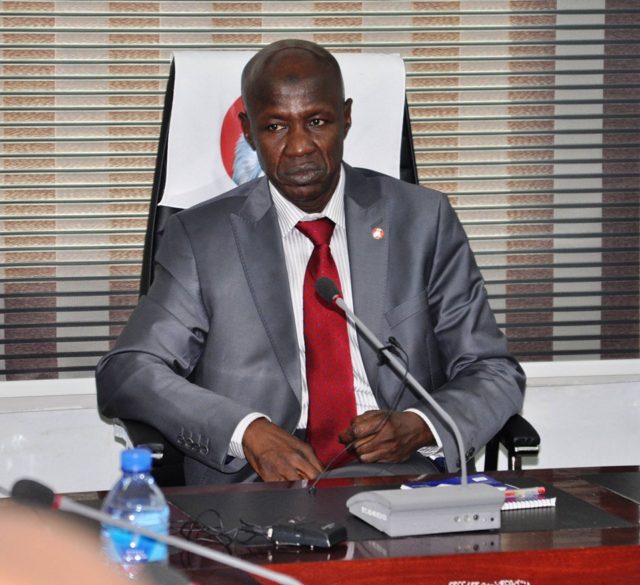Democracy & Governance
Why Corruption Still Thrive In Nigeria -By Segun Ogunlade
The recent arrest and the subsequent suspension of Ibrahim Magu as the acting Chairman of the Economic and Financial Crimes Commission on issues relating to corruption show that corruption is everywhere, even among those charged with fighting it. This is the same time the arrest and extradition of Hushpuppi are making headlines. One could then ask why the fight against corruption remains largely unsuccessful in Nigeria.
That corruption is a cankerworm that has eaten deep into Nigeria’s fabric is a well-known fact. The word ‘corruption is now almost synonymous with the word ‘Nigeria’. Despite the country’s purported fight against this menace, it has continued to wax stronger and stronger. As someone once joked, as the country continues to fight corruption, corruption is also fighting back. Inasmuch as that was said on a lighter note, it seems true. It seems Nigerians are fantastically corrupt after all.
The recent arrest and the subsequent suspension of Ibrahim Magu as the acting Chairman of the Economic and Financial Crimes Commission on issues relating to corruption show that corruption is everywhere, even among those charged with fighting it. This is the same time the arrest and extradition of Hushpuppi are making headlines. One could then ask why the fight against corruption remains largely unsuccessful in Nigeria.

Apart from the Economic and Financial Crimes Commission (EFCC) and Independent Corrupt Practices Commission (ICPC) prosecuting the battle against corruption the wrong way and often playing the cards of their political overlords, for me, the failure of the fight against corruption starts with how people perceive political offices or any position that puts them at an advantaged position over others. Many Nigerians see political offices as where you make money very quickly and use their advantage positions to extort people that depend on them. That is why when you ask people on the street what they would do if they have the chance to become a governor or a president, more than half of them would say they would eat out of the national cake. But the fact remains that this cake has been being eaten for too long and one day it would finish and there would be nothing to eat again.
Unfortunately, the way the country is structured makes it easy for corruption to thrive. It appears Nigeria and its institutions are deliberately tailored to fail, thereby allowing corruption to continue unabated. It remains largely doubted if such amounts that had hitherto been stolen from the shores of Nigeria would hit a foreign bank account in a place like USA or the UK without its source been traced and found as stolen. Except the countries where those stolen funds have been uncovered would want to claim otherwise, keeping stolen money for the one that stole it is a criminal offense and is tantamount to felony under law. That makes the countries our stolen funds are taken to accomplices of some sort in the matter.

But whether the countries choose to repatriate the stolen funds or not is not the real problem. For public office holders to have almost unrestricted access to public funds and could steal from it whenever they wish to is disturbing. The fact that stolen funds could leave Nigeria and the institutions would be overly oblivious of it is even more worrisome. It only proves how weakened Nigeria institutions are. Stealing without being detected is one of the factors that make the fight against corruption a slippery battle. That is expected since the people’s desire to steal is met with no stiff opposition to deter them.
The way I see it, it is the lowest form of thinking that could male people steal money from people that needed it and take them to countries where it had not been worked for. The fact that many of the country’s greatest looters still walk freely on the streets and parading themselves as statesmen shows the parody that the fight against corruption in Nigeria has become. That men who steal and stashed away from public funds in farmlands and foreign bank accounts walk freely out of courtrooms while those who steal goat or garri are incarcerated shows why people have the audacity to continue stealing. The immunity clause attached to some offices gives the occupant the audacity to steal while in office and get away with it when they leave the office. The few among them that ever get punished were those that become politically vulnerable. Once you align with the wrong people in Nigeria’s politics, you are susceptible to witch-hunting by ‘the powers that be.’ But the ones that play their cards right always get away with various degrees of larceny.
The immunity they enjoy while in office is like the hegemony that some ethnic groups in the country have over others. This type of hegemony is characterised by social inequalities and differentiation being related to cultural criteria on the basis of the group you belong to. It is this hegemony that has unnaturally prevented some people from occupying some positions in the country. Thus, some ethnic groups are subjected to a systematic form of discrimination by another and the dominant group seeks to justify its dominance and the existing social system by some kind of deterministic ideology according to which an individual by being a member of an ethnic group can do nothing to alter this situation. This also accounts for why the fight against corruption remains unsuccessful hitherto.
Corruption is common in high places as it is in the low places of the country. From the student that inflates his school fees because he is smart and his parents wouldn’t know to the religious leader that talked his congregation into releasing their hard-earned money for God’s use only to use them for his own ends and the market women that has systematically reduced the size of her measuring rubber so as to increase her gain on the bag of rice, all of them are as corrupt as the governor or the Director-General that steals what doesn’t belong to him.
Unfortunately, there are no EFCC or ICPC to wage war against corruption going on in the low places. EFCC and ICPC are out against institutional thieves and not the football coach that denies a good footballer a place in the national team because she didn’t pay extra money like everyone else. The security man at the bank wants you to tip him before he could help you and the bus driver increases his bus fare once it gets to rush hour because he knows people are always desperate to go home not because the road has been extended. That is how much corruption is engrained in society and has refused to go away no matter how violently we fight it. Thus, the citizens’ low sense of responsibility either to the country or to their neighbours makes it hard for corruption to be fought by those fighting it. These days, everyone seems to be out to take advantage of another unsuspecting person.
To have a better outcome in the fight against corruption, the country’s institutions need to be strengthened so as to make stealing difficult easy in the first place. This should start by ensuring that political office holders and other officials of the state do not have uncontrolled access to public funds. We don’t need to start the fighting when the stealing had been done but prevent it from happening undetected.
Also, people should stop celebrating politicians and giving them chieftaincy titles. In the past, chieftaincy titles are for those who excel morally. Now, they are for those who excel materially and whose source of income remains questionable. We need to make them know they have something wrong when they steal from public coffers because the money isn’t theirs. We need to let them know that for every penny they steal or mismanage, hundreds of people suffer for it in terms of basic amenities such as good road networks, good hospitals, and good schools.
The agencies responsible for fighting corruption should also be made an independent body and free from control from politicians. The highest number of people guilty of institutionalized corruption is in the political class. So long as the major appointments in these bodies are still made by them, the fight against corruption will continue to remain elusive. After all, people don’t often bite the finger that feeds them so that they could always continue to be fed by that finger. When agencies such as EFCC and ICPC become truly independent, the fight against corruption wouldn’t be launched against the people that are not in alliance with the politicians that appoint them, but against everyone that is corrupt.
Lastly, people should have a high sense of responsibility and should not see every opportunity as an avenue to extort another vulnerable citizen who is also a victim of the system. We shouldn’t steal from ourselves because the other person is unsuspecting. We should be true to everyone as we are to ourselves and condemn every form of corruption whenever we see it.
God bless Nigeria.
Written by Segun Ogunlade


















